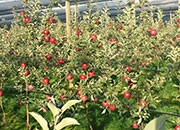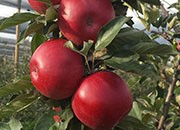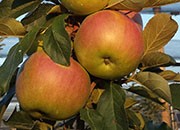Apple Fun Facts
Apple is a common name for the varieties of Malus domestica Borkh. Other names and synonyms are: Malus communis Lam., Malus silvestris Mill. (wild apple), Malus pumila (pitoma jabuka), Malus Paradisiaca Med., Pirus malus v. austera (sour apple).
Apples are a member of the rose family.
The apple tree originated in an area between the Caspian and the Black Sea.
Archeologists have found evidence that humans have been enjoying apples since at least 6500 B.C.
Charlemagne (Charles the Great) ordered the planting of several varieties of apple trees in his empire during the 800s. There were known almost 200 varieties of apples in 1.600s!
There were used phrase 'ab ovo usque ad mala' in Roman times. It refers to the course of a Roman meal, which often began with eggs and ended with apples.
The Apple is popularly known as the supposed forbidden fruit of Eden. But this is not mentioned anywhere in the Bible!
In ancient Rome, apples were regarded as luxury fruits.
Fresh apples float because 25% of their volume is air.
Apples ripen six to ten times faster at room temperature than if they were refrigerated. For optimal storage, apples should be kept at 35-40 degrees with relative humidity of 80-90%.
China produces the largest amount of apples.
The largest importers of apples are Russia, Germany and the UK.
The Turks eat the most number of apples per person in the world.
The average Europeans consumers eat an estimated 20 kg of apples a year.
In Africa, apples are only grown in the Mediterranean regions.
The largest apple ever picked was heavy 1.45 kg.
Apples should be eaten with the skin, because most of the anti-oxidants in apples, including Quercetin, are found there.
A medium sized apple contains 80 calories.
There are more than 8.000 varieties of apples!
In the Chinese culture, the word for apples is pronounced as ‘ping’ which also stands for peace. This is why apples are a popular gift to give when visiting someone in China.
Isaac Newton is said to have discovered the Law of Gravity when an apple fell on his head!
Freshly pressed apple juice immediately turns brown upon contact with air because of oxidation. A nifty trick to prevent fresh apple juice from turning brown is to add a few squeezes of lemon juice or lime juice. This helps prevent oxidation.
Apples are extremely rich in important antioxidants, flavonoids, and dietary fiber. The soft inside part of apples provides soluble fiber, while the tough outer skin is insoluble fiber. Soluble fiber binds with water and slows digestion. Insoluble fiber stays intact and pushes out waste, making your stools soft and keeping you regular. Apples are rich in carbohydrates and Minerals such as calcium, potassium, and phosphorus.
Apples contain high levels of boron, which stimulates electrical activity of the brain and increases mental alertness.
Apples may not be rich in calcium, but its high levels of boron make it a great food to prevent osteoporosis and strengthen bones.
Apples have the ability to boost estrogen levels in menopausal women to a great extent.
Apples are very useful for proper sleep, can help decrease blood pressure, dizziness, obesity, headache, migraine, diarrhea, sore throat, burns, The phytonutrients and antioxidants in apples may help reduce the risk of developing cancer, diabetes, and heart disease.




